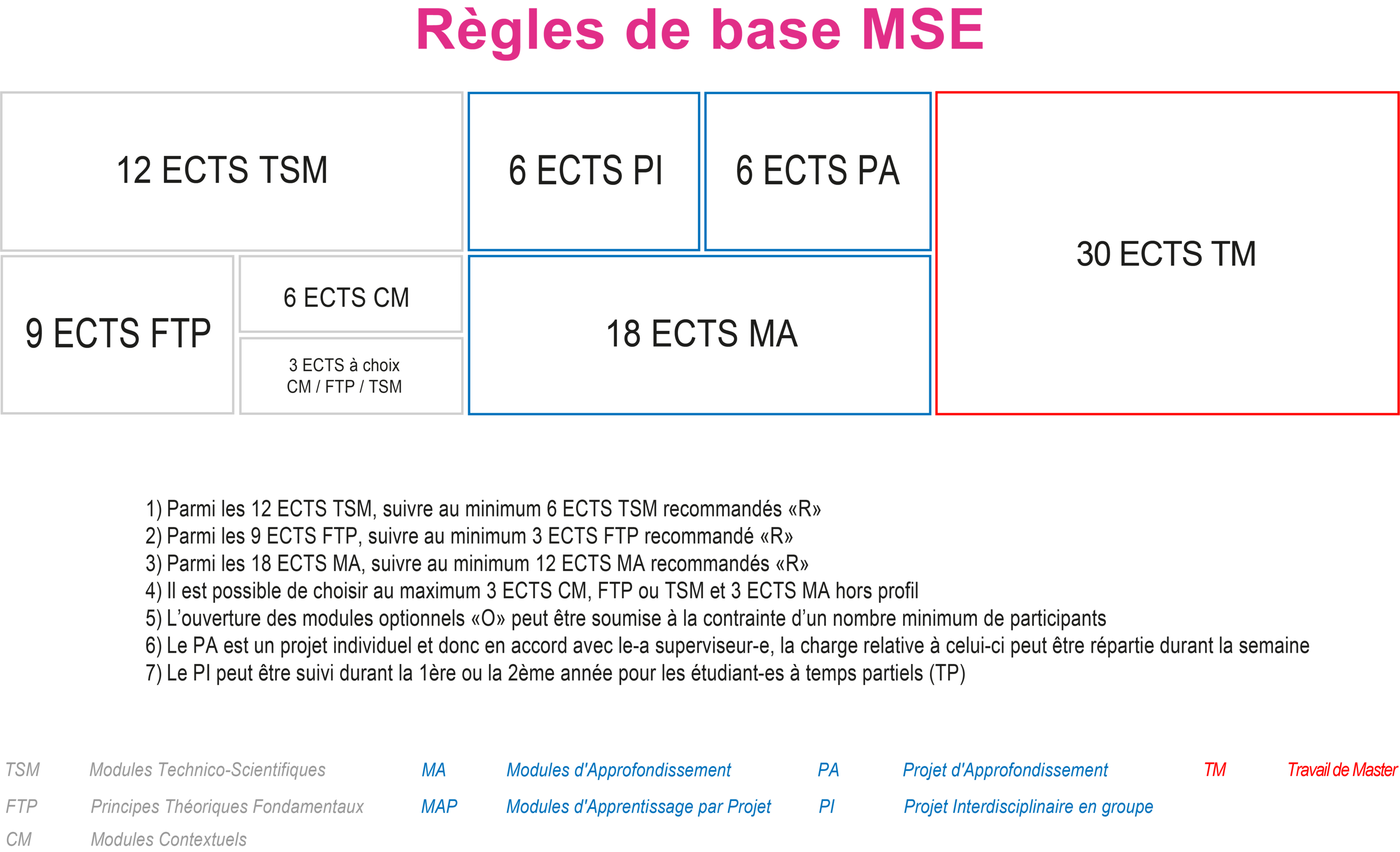The MSE Electrical Engineering (ElE) profile is designed to provide students with the knowledge that will enable them to study, analyse and formalise problems and solutions in the fields of weak currents (signal) and strong currents (power).
Concept
At the beginning of the study cycle, students will have an opportunity to consolidate the knowledge acquired during the Bachelor cycle. The second phase will then allow them to study, analyse and fine-tune the various topics that are characteristic of Electrical Engineering, through scientific approaches that support the purely technical knowledge already acquired.
An important part of the training is determined by the fact that electrical engineers are most often called to work on multidisciplinary projects, such as the implementation of a digital signal microprocessor for a medical imaging application, or the application of embedded systems for the control of electrical drive systems for vehicles. The program will give students the broadest general training so that they are able to work closely with engineers of other specialties, around topics and applications that are not purely electrical engineering.
Finally, at the end of the study cycle, a specialisation is offered to allow students to deepen their scientific and technical knowledge and skills in one of the two fields of Electrical Engineering, either weak currents (signal) or strong currents (power).
It is important to note that this training is not focused only on purely scientific approaches, but also on the application of technologies in a way that reflects both economic realities and modern electrical engineering techniques.
Target group
The MSE's Electrical Engineering program is primarily intended for holders of a Bachelor’s degree in electrical engineering from one of the Swiss universities of applied sciences (UAS), UAS Bachelor's programs in related fields, or holders of other qualifications deemed equivalent.
Professional profile
Graduates of the MSE Electrical Engineering profile will be engineers with advanced technical skills. They can be project managers and technical service managers. They will have the necessary skills to contribute to the advancement of the state of the art in the field of electrical engineering.
They will be specialists in the design of electrical and electronic circuits, both analogue and digital, whether in the field of signal and information processing and transmission or in the field of production, transport, storage and exploitation of energy and electrical power. They will be capable of analysing and formalising the problems submitted to them, and of specifying electrical and electronic solutions. This is particularly true in interdisciplinary fields and in collaboration with colleagues in these fields, whether industrial or commercial or both.
Skills to be developed
The students of the MSE Electrical Engineering profile must be able to demonstrate that they can autonomously:
- Advance the state of the art through applied research and development activities, according to their field of specialization, or in a very broad multidisciplinary context
- Develop innovative concepts
- Ensure the dissemination and communication of the concepts developed
- Supervise applied research and development (R&D) activities within the team they lead
- Evaluate the work of their subordinates and ensure the implementation of any corrective actions if necessary
- Analyse and define specifications
- Manage the manufacture, operation and maintenance of electrical and electronic components and systems
- Ensure that product development reflects the economic reality of the market and possible environmental impacts
These professional skills are of course exercised in a specific way in Electrical Engineering, according to two proposed specialisations:
- Weak current and signals
- Strong current and power
Specialisations
The Electrical Engineering profile covers a large number of thematic areas, and students are offered the opportunity to define part of their study programme within the framework of an individual study agreement. This is done according to two framework specialisations:
- Weak current
- Electronic systems: This area deals with the specification, design and verification of analogue and digital electronic circuits and systems with discrete components and/or integrated on a semiconductor chip. Particular attention is paid to the systems view of complex devices, including functional breakdown and simulation.
- Embedded systems: This area covers aspects related to microcontrollers, digital signal processors and programmable logic devices. The software engineering of these systems is also an important element, focusing in particular on the aspects of real time, computing power and execution time. A strong emphasis will be on the reliability and availability of the embedded systems, as well as on cost constraints. The fundamental principles of hardware-software design are developed, as well as techniques, devices and processes related to wired and wireless communication network technologies.
- Signal processing: This thematic area will examine in depth notions of signal processing, in particular its random and stochastic aspects, as well as multidimensional analyses, such as image, time-frequency (spectrogram, wavelets) in 2D and applied to data fusion, and neural networks (e.g. machine learning) for higher numbers of dimensions. An important place is given to signal modelling for prediction or noise reduction.
- Communication and information systems: This area is linked to the emergence of embedded electronics, the Internet of Things (IoT) and new wired and wireless communication technologies. These require in-depth scientific and technical knowledge for the understanding, design and characterization of the various analogue and digital components that make up the transmission and reception chains (antenna, filter, coupler, amplifier, circulator, etc.)
- Strong current
- Energy conversion systems: This area deals with systems that have two main functions, namely the conversion of electrical energy by power electronics systems, and the conversion of electromechanical energy by electrical machines. These two fields represent a subject of great importance, from low-power battery charging devices (smartphones, domestic appliances) to the high-power pumping/turbine group associated with hydroelectric power plants. Whether in the home, in the transport sector or in industry, they are widely used in our society. The burning issues related to sustainability and renewable energy further reinforce the importance of such systems and the increased need for young graduates who are aware of the latest technologies.
- Electrical networks: This topic covers aspects of energy conversion, storage, distribution and demand management. When connecting a load (e.g., a fast charging station for electric vehicles) or a power source (e.g., a solar installation) to the grid, it is important to know how the grid will behave, and what the limits will be. This will have an impact on the design and control of energy conversion systems, leading to the notion of a smart grid.
Contact
Philippe Barrade
Head of the ElE profile (major)
HES-SO Master
Av. de Provence 6
1007 Lausanne
T + 41 58 900 00 00
mse(at)hes-so.ch



